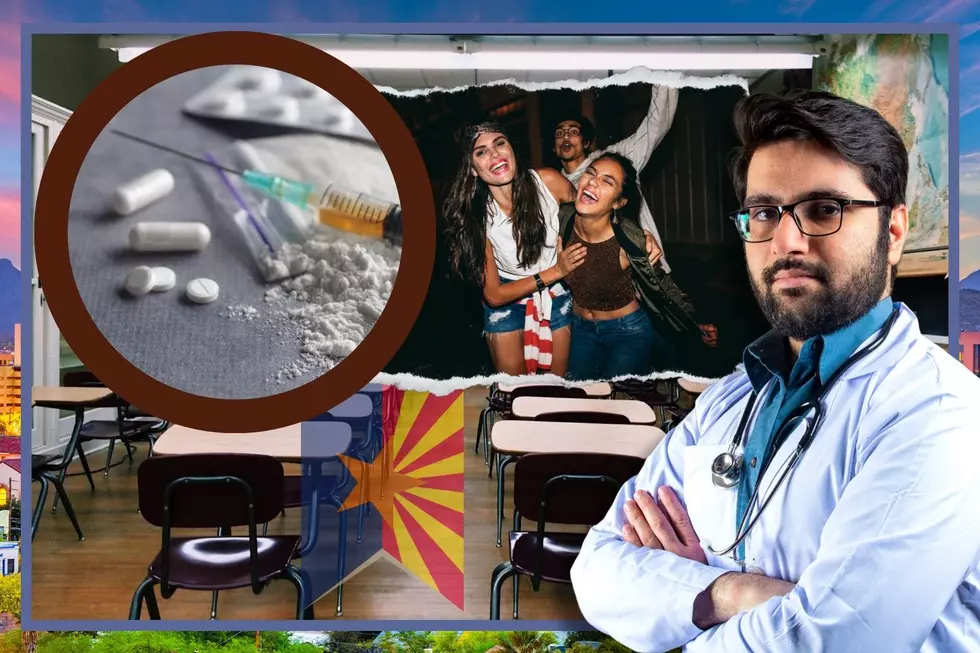
Social Media in Arizona: Fighting for Our Children
Social Media Didn't Start the Fire, But They're Stoking the Flames
Social media didn't invent bullying. Facebook didn't create human trafficking. TikTok didn't fund the cartels. They didn't start the fire, but they're giving oxygen to the flames.
Social media magnified all these things when they created platforms that can now bring the seediest parts of human behavior into the palm of your hand. And into the hands of our children.
READ: Scary: 4 Arizona Truck Stops on "Do Not Stop" List!
When kids receive a cell phone and access to social media, their lives change forever. Children, teens, and young adults are some of the most vulnerable users of social media and the twisted underbelly of the digital age.
Necessity: When Arizona Children Get Their First Cell Phone
According to an article in the National Library of Medicine titled Perspectives on the Recommended Age of Mobile Phone Adoption: Survey Study, the average age at which a child receives their first smartphone is around 12 years old.
According to their findings: "On average, respondents obtained their first phone at 12.2 years of age. Most participants (325/459, 71.1%) stated they received their first phone out of necessity rather than for entertainment or social reasons."
In an age where public telephones have almost completely vanished, it's easy to understand why parents give this technology to their children. However, the unintended consequences are opening a new public conversation.

The Discussion in Arizona: The Unintended Consequences of Kids and Cell Phone Use
I spoke with Commander Bob Watkins of the Cochise County Sheriff's Department. The CCSO is partnering with Thunder Mountain Church in Sierra Vista to "talk about the effects of social media on our youth and our community."
Commander Watkins recommended watching the documentary Childhood 2.0 - A Documentary About Growing Up in the Digital Age, which will be central to the upcoming discussion surrounding the effects of social media on our kids.
You can watch the full video presented by YouTube user Bark:
"This documentary was eye-opening," Commander Watkins said. "The movie highlights how social media is changing [the way] our children experience childhood." Throughout the film, children talk about their experiences. Hearing their stories in their voices, in their own words, is daunting.
"There's been a 4000% increase in diagnosed mental health issues in children since 2010," Watkins continued, "and that has been proven to have a direct correlation to social media."
In previous generations, if a child was bullied at school, they could shut down the hazing when they were away. That's no longer the case. With texting and social media, the taunting doesn't end with the final school bell, and that can have dire consequences.
"Kids never get a reset or an escape, which has an emotional effect on their mental health." The risk of self-harm and suicidal ideation has skyrocketed since we were kids, he said.
The Big Picture: Youth Smartphone Use in Arizona
"I thought I was giving my son access to the world. Instead, I gave the world access to my son."
Commander Watkins expressed the regret many parents have after giving their child a mobile device. He's not alone; as parents, it's easy to justify giving cell phones to our kids.
Most children can handle added responsibility at around twelve years old, so trusting them with devices like their own cell phone feels like a natural decision for any parent. As kids gain independence, it feels as though we're making them safer with the devices, but it can have the opposite effect.
"When I grew up in the 1980s, my parents were afraid of [the threat of] the white, windowless van," Commander Watkins said. "It may still exist, but it pales in comparison to what our children have access to on their phones."
Watkins said, "2023 was the year the digital footprint died." With the rise of AI, it's easier than ever to fake someone's voice or to create a fake photo or video of someone simply using freely available artificial intelligence tools. And these deep fakes have been used to exploit people, especially our kids.
How Cartels Exploit Youth in Arizona with Social Media
Modern cartels and bad actors worldwide have become masters at exploiting social media for their gain.
- Cartels geo-fence high schools using social media, especially in low-income areas, to recruit kids for human smuggling and trafficking operations, promising to pay them as much as $2,500.
- Drugs like fentanyl can be purchased for less than a dollar a pill through social media sites with no more than two clicks.
- Children have been lured into human trafficking and child sex trafficking through social media.
This is just the beginning. If you're in Cochise County and want to be part of the conversation to change the story for our children, attend the FREE event, TOWN TALK hosted at Thunder Mountain Church on Monday, April 8th, at 6pm.
Learn more on the Cochise County Government Facebook page.
[ National Library of Medicine | JMIR Publications | Childhood 2.0 Movie | YouTube: Social Media Dangers Documentary | Wikipedia.org | Cochise County]
LOOK: Best public high schools in Arizona
Gallery Credit: Stacker
9 of the Top Things Arizona is Worried About this Year
Gallery Credit: Val Davidson/TSM
LOOK: Where people in Arizona are moving to most
Gallery Credit: Stacker
More From K101









